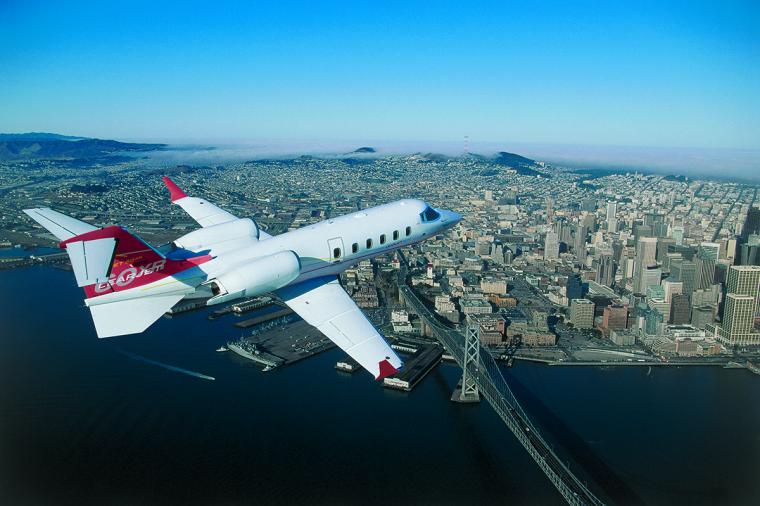
 Kansas may be known for its geographically central location in the country, as a leading producer of wheat and beef in the farm belt, and as the state where freedom-loving pioneers would make their stand against slavery, but Kansas is also a key player in the rapidly expanding global aerospace industry.
Kansas may be known for its geographically central location in the country, as a leading producer of wheat and beef in the farm belt, and as the state where freedom-loving pioneers would make their stand against slavery, but Kansas is also a key player in the rapidly expanding global aerospace industry.
Home to one of the five great aerospace clusters in the world, Kansas is a leader in aircraft design and manufacturing of general aviation aircraft, as well as major structures for commercial and defense aircraft. More than 67 percent of the world’s embedded general aviation fleet was manufactured in Kansas.
The aviation industry has continued to grow in Kansas since the industry’s genesis. In 1925, Walter Beech, Clyde Cessna and Lloyd Stearman formed their own company, Travel Air, to build airplanes in Wichita. The three men are among the original aviation pioneers, and through their risk-taking, entrepreneurship, collaboration and innovation, they helped create the Kansas aviation industry, and in 1927, the city of Wichita started to promote itself as the “Air Capital of the World.”
 All three went on to further chart their own paths and pursue their dreams, which led to the world-class companies of today that are a significant part of Kansas’ aerospace cluster. In 1927, Clyde Cessna formed Cessna Aircraft Company and Lloyd Stearman formed Stearman Aircraft Company, and in 1932, Walter & Olive Ann Beech formed the Beech Aircraft company.
All three went on to further chart their own paths and pursue their dreams, which led to the world-class companies of today that are a significant part of Kansas’ aerospace cluster. In 1927, Clyde Cessna formed Cessna Aircraft Company and Lloyd Stearman formed Stearman Aircraft Company, and in 1932, Walter & Olive Ann Beech formed the Beech Aircraft company.
Beechcraft and Cessna are now part of Textron Aviation, which today supports about 10,000 jobs in Kansas. Stearman became Boeing Wichita, which is now Spirit AeroSystems.
More than 90 years later, Wichita is still known as the Air Capital of the World and boasts major aircraft manufacturers employing thousands of Kansans: Airbus, Bombardier Learjet, Textron Aviation and Spirit AeroSystems. And Kansas continues to foster an environment that leads to innovation and risk taking, forming the next great ventures and success stories for the state.
 Aviation Industry Facts
Aviation Industry Facts
• Kansas-based Textron Aviation (Beechcraft and Cessna) and Bombardier-Learjet delivered 35 percent of U.S.-manufactured general aviation aircraft shipped in 2018 (25 percent of global aircraft). Textron also recently announced plans to hire 1,000 workers this year.
• Spirit AeroSystems is the world’s largest independent producer of commercial aerostructures.
• Airbus has its largest engineering center outside of Europe in Wichita and has a new facility on the Wichita State University Innovation Campus.
• Leading avionics suppliers Honeywell and Garmin each have operations in northeast Kansas, employing over 3,000 people.
Overall, 30,000 people are employed in aerospace in Kansas, with highly skilled individuals working at both the major airplane manufacturers and at more than 450 aviation suppliers and service providers. A contributing factor to the success of the state’s aviation industry is the positive and productive business climate in the Sunflower State, and support for delivering a trained workforce.
 A Trained and Ready-to-Work Workforce
A Trained and Ready-to-Work Workforce
In addition to Kansas’ business-friendly climate, the state boasts a university and technical training system that produces a steady flow of educated and certified workers. There are 58 colleges in Kansas, including 33 public and 25 private institutions, which help to funnel skilled and talented professionals into the Kansas workforce.
For the aviation industry specifically, Wichita State University (WSU) is home to the National Institute for Aviation Research (NIAR), a major research site with extensive facilities, qualified staff and expertise in large aerospace structures and composites. The National Center for Aviation Training (NCAT), which is part of WSU Tech, is a world-class aviation manufacturing training center on the grounds of the Jabara Airport in northeast Wichita. Further, Kansas State University’s Polytechnic Campus offers both associate and bachelor’s degrees in aviation maintenance and professional pilot, and an associate degree in avionics, while the University of Kansas offers both undergraduate and graduate programs in aerospace engineering.
Businesses from Kansas’ aviation industry and many other sectors also leverage programs available through the Kansas Department of Commerce that give businesses an opportunity to retrain professionals with the specific skills they need, directly from the college or training program. A Career and Technical Education initiative allows high school students to get a head start on their postsecondary education by taking technical classes tuition-free. This program has resulted in a record number of Kansans graduating from high school with industry-recognized credentials. The credentials are usually in occupations that are in high demand, helping students find jobs and businesses fill critical open positions.
 Another workforce initiative that provides businesses in Kansas with talented job candidates is called Workforce Aligned with Industry Demand, or Workforce AID. This effort is a partnership between businesses and technical colleges to set up training courses that help Kansas students learn the in-demand skills that employers are seeking from new hires. Through this collaboration, Kansas colleges and employers are ensuring that graduates and future employees are well-prepared for their future professions and can support local industry needs. These programs are also beneficial to the student because students meet with employers and interview with the participating businesses upon completion. The program is unique in that it assists the students, colleges and businesses in getting what they each need to succeed.
Another workforce initiative that provides businesses in Kansas with talented job candidates is called Workforce Aligned with Industry Demand, or Workforce AID. This effort is a partnership between businesses and technical colleges to set up training courses that help Kansas students learn the in-demand skills that employers are seeking from new hires. Through this collaboration, Kansas colleges and employers are ensuring that graduates and future employees are well-prepared for their future professions and can support local industry needs. These programs are also beneficial to the student because students meet with employers and interview with the participating businesses upon completion. The program is unique in that it assists the students, colleges and businesses in getting what they each need to succeed.
Through educational opportunities and top-notch experience in Kansas companies, businesses in the state have access to a highly skilled and talented workforce. Kansans have always been known for their work ethic and dedication, and this tradition continues today.
In Kansas, the Sky Isn’t the Limit
In addition to an incredible workforce and immense educational opportunities, Kansans also enjoy a superb quality of life. The state’s clean and thriving cities are home to diverse cultures and offer a wide range of activities. There is always a way to enjoy life in Kansas—from recreational opportunities and sports teams, including both university and professional, to music and performances at nationally renowned venues.
Of course, the state is well-known for its friendly small towns and wide-open spaces. The endless sky and beautiful, untouched wilderness can be enjoyed at any of Kansas’ 55 state parks, 36 State Wildlife Areas, three National Wildlife Refuges and Prairie National Park.
A key part of choosing a business location can be defined simply as community. Kansas communities are known for their heartland values: hard-working, fun-loving and honest. And there are so many ways to connect with the community in Kansas, including impressive entertainment, arts, sports and great schools. T&ID
Incentives-at-a-Glance
Finance Programs
• Promoting Employment Across Kansas (PEAK)—Offers qualified companies the ability to retain 95 percent of their payroll withholding tax for several years.
• Industrial Revenue Bonds (IRBs)—Securities issued by cities and counties to provide funds for creditworthy companies to acquire land, construct and equip new facilities, or remodel and expand existing facilities.
• Community Development Block Grant (CDBG)—A source of financing for companies that are expanding an existing facility or starting a new operation in the non-metropolitan areas of Kansas.
Workforce Development Assistance
• Kansas Industrial Training (KIT)—Available to companies creating new jobs.
• Kansas Industrial Retraining (KIR)—Available to retrain a company’s existing workforce on new technology or production activities.
Tax Incentives
• High Performance Incentive Program (HPIP)—Provides a 10 percent corporate income tax credit on the qualified capital investment for companies that pay above-average wages.
• Machinery & Equipment Expensing Deduction—An expense deduction for business machinery and equipment.
• Machinery & Equipment Property Tax Exemption—A tax exemption for qualified commercial and industrial machinery and equipment.
• Property Tax Abatement—Cities or counties may exempt real property from ad valorem taxation.
• Sales Tax Exemption—Such as labor services related to original construction, remodeling costs and new machinery and equipment for manufacturing.

